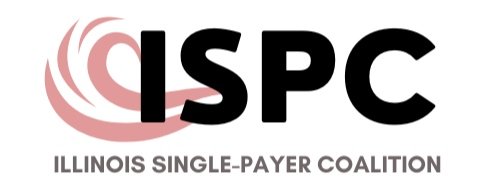Position Statement on House Bill 1384: Medicare for All Act of 2019
The Illinois Single-Payer Coalition is thrilled to see the introduction of House Bill 1384, the Medicare for All Act of 2019. We believe the House Bill, if enacted, would be a tremendous step forward in securing accessible, quality care to everyone living in the United States. The bill embodies the key principles of a single-payer system:
Universal coverage. Every resident of the United States is entitled to benefits.
Comprehensive services. Covered services include hospital services, primary care, specialty care, prescription drugs, mental health and substance abuse treatment, reproductive care, dental, vision, audiology, emergency services and transportation, and long-term care.
No cost-sharing. There are no co-payments, no deductibles, no premiums.
Freedom of choice. You go to the qualified provider and hospital of your choosing.
We are especially pleased with these facets of the bill:
It includes long-term care.
We believe long-term care is healthcare and any single-payer bill should cover it. The house bill prioritizes home and community-based services over institutionalization. It mandates services and supports be provided in the least restrictive environment and maximizes individual autonomy.
It excludes value-based payments.
Value-based (pay-for-performance) payments became popular with the Affordable Care Act. They reward providers for better patient outcomes, with the intention of improving outcomes. However, they have shown no improvement in patient outcomes; instead, they have resulted in discrimination towards the poor and sick and an increase in provider burnout and administrative load.
It mandates safe nurse-to-patient staffing ratios.
Good staffing ratios result in safer patient care. This is the first single-payer bill to establish mandatory minimum safe nurse-to-patient staffing ratios.
It allows the override of drug patents.
In the event a drug manufacturer will not agree to a reasonable price, the Medicare program will be able to override a patent so that another manufacturer can produce the drug at a reasonable price.
It eliminates the dominant role of investor-owned insurance companies.
Much of the bloated costs, barriers to care, and emotional stress associated with the current U.S. system for financing healthcare is due to the system-wide control exercised by private health insurance companies. They offer no value to health care or health care financing, yet they skim off vast sums from the system and impose themselves continually in the doctor-patient relationship. Eliminating their role, will make U.S. health care financing more efficient and improve health outcomes.It includes global budgets which will result in substantial savings for hospitals.
Our current system of itemized billing requires huge expenditures on billing staff and technology. Global budgets will reduce hospital operating costs and let them concentrate on delivering care.It prioritizes health equity.
The House bill requires that capital expenditures be allocated first to medically underserved and rural areas. It mandates ongoing assessments of healthcare disparities and recommendations to improve disparities.
Excellent though it is, the House bill could be improved with these changes:
Ban investor-owned facilities.
With this legislation, healthcare facilities could still be owned by for-profit entities. While the bill states that payments to providers cannot be spent on marketing, profits, union-busting, or political contributions, it is unclear how these restrictions will be monitored or enforced. We expect that investor-owned facilities, as we see in so many cases, will bend the rules and regulations to their advantage, and patient care and staff working conditions will be compromised.
Simplify and shorten the transition.
The bill outlines a two-year transition. One year after passage of the bill, Medicare is expanded to include those 55 and over and 18 and under. During this year, a Medicare Transition plan would be created with new premiums and cost-sharing subsidies dependent upon age, tobacco status, type of coverage, and income. This transition would require significant time and resources to create a plan that will exist for only one year.
The transition delays coverage for those of child-bearing age: the U.S. has egregious racial inequities in maternal and infant morbidity and mortality. We argue that everyone be included in the program from day one! We advocate for a bill that improves the Medicare program, and expands to include everyone at the same time. Everybody in, nobody out!
